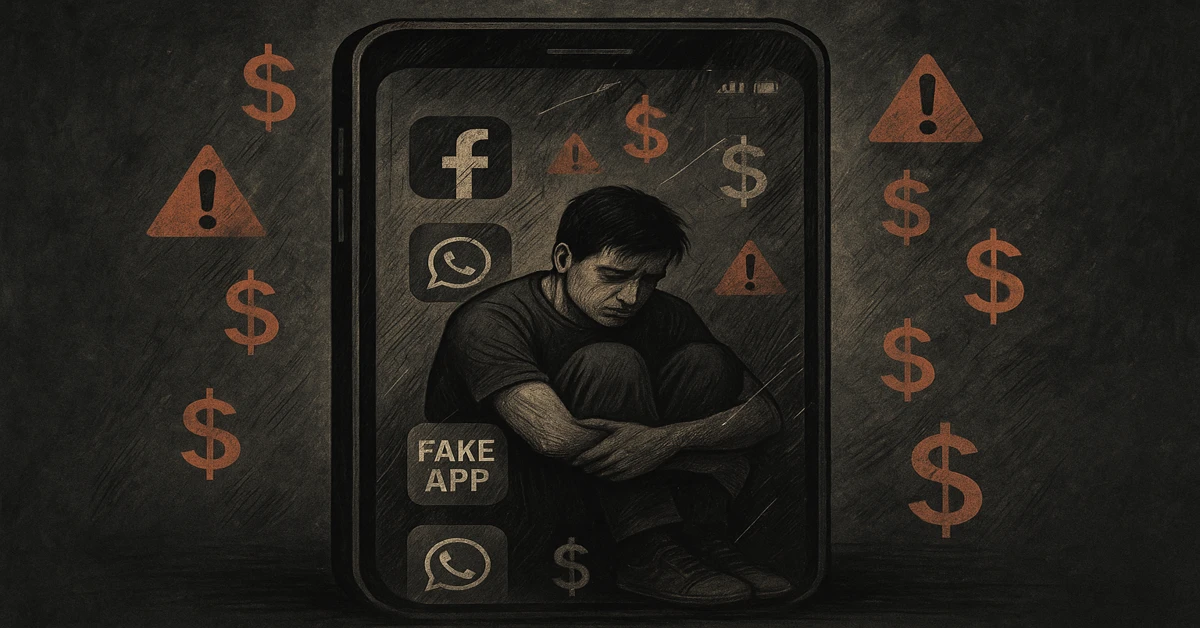Last Updated: July 12, 2025
How Scam Apps, Fake Jobs & Social Media Scams Are Looting Pakistanis in the Name of Online Earning

Lahore, 2025 – It all began with an innocent Facebook ad: "Earn Rs. 5,000 per day from your phone! Just type and get paid." Ali, a college student from Okara, clicked the link, filled a form, and received a WhatsApp message: "Just pay a one-time registration fee of Rs. 850 and start earning." That was 8 months ago. He never saw a single rupee.
The Digital Dream: Hope or Trap?
Pakistan's youth are being lured by thousands of online schemes every day. What starts as a dream to earn from home often ends in emotional and financial devastation. From fake job ads to scammy apps, fraudulent courses to unpaid freelancing, digital deception is now a billion-rupee industry.
⚠️ Major Categories of Online Scams in Pakistan
1. WhatsApp Job Scams & Fake Typing Work
Scammers post ads like "Work from Home – Earn Rs. 12,000 Weekly" on Facebook, Instagram, or YouTube comments. They provide a WhatsApp number. Once contacted, users are asked to pay Rs. 500–2,000 as a 'registration fee'. After payment, the scammer blocks them or sends fake tasks with unreachable payout thresholds.
2. Social Media Influencer Scams
Self-proclaimed 'digital coaches' promote fake earning apps or courses with photos of luxury cars and screenshots of earnings. They charge Rs. 5,000–30,000 for a 'course' that teaches nothing new or real. Some even run MLM-style referral schemes under this mask.
3. Scammy Apps (HFC, FXCOPY, HTFOX etc.)
These were disguised as investment or trading apps (often connected with Binance wallets). Users were promised high returns and guided through Telegram groups. Once enough deposits were made, the apps vanished—causing nationwide losses of over Rs. 17 billion in late 2021.
4. Fake Freelancing Clients
Freelancers are contacted outside secure platforms like Fiverr or Upwork. They’re offered large jobs but asked to pay for software, plugin access, or a "security deposit". Once paid, the client disappears. Others work for weeks and are ghosted without pay.
5. Ponzi & Referral Schemes
Apps or websites promise daily returns if you invest and refer others. Early birds get paid, boosting trust. But like all pyramid schemes, they collapse—and late joiners lose everything. Examples include TaskEarn, GramFree, and QuickCash in past years.
6. Fake Online Courses & Certifications
Some platforms advertise job placement or instant skill certification for a fee. After payment, no real value is provided. Certificates are not recognized by employers or institutions. Thousands fall for this every year hoping to work online abroad.
7. Gambling Disguised as 'Games to Earn'
Apps that appear like games actually involve betting money on spins, matches, or predictions. Examples: Color Prediction Apps, Cricket Betting disguised in gaming UI. They're illegal, addictive, and always rigged in the app's favor.
8. Watch Ads & Earn Apps
These apps promise income for watching ads. You earn coins, but withdrawal thresholds are never met. Once enough people try and fail, the app disappears or resets accounts.
9. Fake Job Portals
Some websites claim to offer overseas or government jobs. They collect documents and registration fees. Victims later learn the jobs were never real. These scams have tricked people into paying Rs. 1,000–20,000 each.
🚩 Red Flags to Identify a Scam
- Too good to be true promises (Rs. 5,000 per day for typing?)
- Registration fee or payment BEFORE job or payout
- Communication only via WhatsApp or Telegram
- No verifiable business or registration number
- Fake reviews and screenshots used to build trust
🔒 How to Protect Yourself
- Use verified job platforms only (e.g., Rozee.pk, Upwork, Fiverr)
- Never pay to get a job or client. Real employers never ask for money.
- Search the business/app name with the word "scam" before signing up
- Talk to friends or family before paying anything online
- Report scams to PTA and FIA Cybercrime
💔 Real Stories from Villages and Cities
In a village near Multan, a man collected over Rs. 1 crore from neighbors to invest in a now-defunct app. In Lahore, a group of girls lost over Rs. 150,000 to a Facebook typing job scheme. Karachi freelancers were conned into unpaid work for weeks.
🧠 Final Thoughts
"Online earning" in Pakistan is becoming the modern face of digital fraud. From big cities to remote villages, these scams exploit our desire to escape poverty or unemployment. The only way to fight them is through awareness, education, and action.
Protect yourself. Speak up. And share this article to protect others.
You May Also Like:

Is There a Real Cure for Diabetes? The Truth Behind Social Media Claims...

How Pakistanis Self-Medicate More Than Any Nation: The Dangerous Pharmacy Culture...

Punjab Police Petrol Scam: Officer Allegedly Fills Rs 80,000 Fuel and Runs Away With Official Vehicl...

How to File an Online FIR in Pakistan: Complete Guide for Punjab, Sindh, KP and Islamabad...

